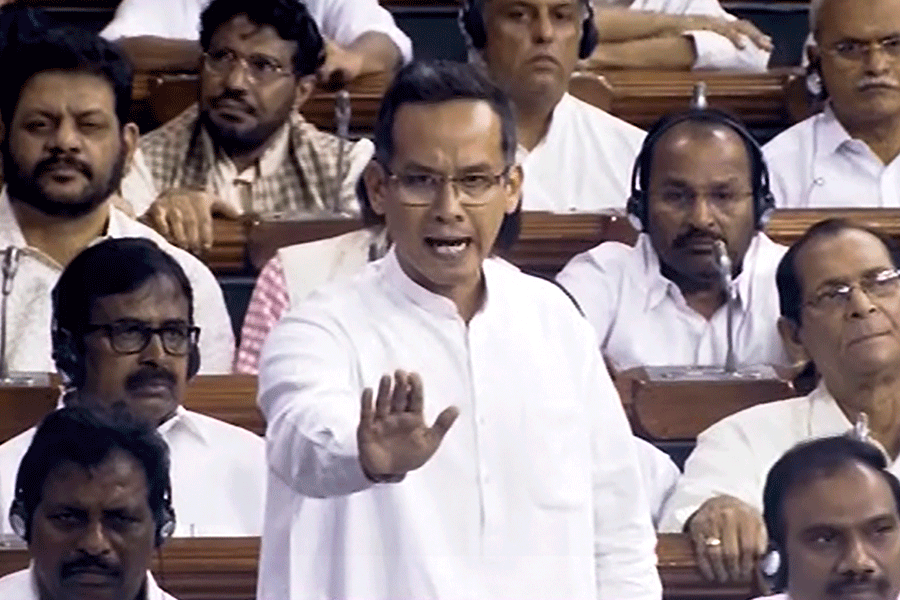Yadi tumhare ghar ke/ ek kamre mein aag lagi ho/ to kya tum doosre kamre mein/ so sakte ho? Yadi tumhare ghar ke/ ek kamre mein lashen sadd rahi ho/ to kya tum doosre kamre mein/ prarthana kar sakte ho? Yadi haan toe mujhe tum se kuchh nahin kahna…
(If one room of your house is on fire, can you sleep in the next room? If bodies are rotting in one room of your house, can you pray in the next room? If yes, I have nothing to say to you.)
Quoting Hindi poet Sarveshwar Dayal Saxena, RJD leader Manoj Jha expressed his despondency over Narendra Modi’s attitude, saying, “Dear Prime Minister, recall that the backdrop of this no-confidence motion is Manipur violence. It is unfortunate that you haven’t understood this vast country so far.
“Two minutes today on Manipur after 30 seconds on July 20, should we consider this the achievement of the no-confidence motion?,” the RJD member of Rajya Sabha asked, wondering how would have the women of Manipur felt listening to the Prime Minister.
“The nation has to evaluate him now,” he said in a sense of exasperation.
Manipur, writhing in pain, yearned for a healing touch. What it received from the Prime Minister after 99 days of silence is an appeal for peace, coming after a frenzied two-hour political shelling, stigmatisation of rivals, arrogant boasts and cheap jokes.
Congress spokesperson Pawan Khera said: "A tired, desperate and conceited called down curses upon the Opposition, apart from forwarding fake wisdom gathered from WhatsApp.”
Amid laughter and taunts for so long, the dormant grief of Manipur craved a serious parliamentary discussion. The Opposition parties, bored by forgotten tales from the dustbin of history and wild allegations, finally walked out. The Prime Minister then remembered the bleeding Manipur but avoided getting into specifics as the home minister had already dwelt on the subject. He took care to shift the blame on the judiciary for the flare-up and the Opposition for the delayed debate.
Modi obviously didn’t explain why he remained silent for so long, refusing even to meet the delegations from Manipur or tweet on the issue, and why the simple appeal for peace came after 99 days. Gaurav Gogoi, who had moved the no-confidence motion, said: “We didn’t see any intent to provide justice to Manipur. It was clear that chief minister N. Biren Singh divided the state. The Prime Minister didn’t explain why he was protecting him.”
Summing up the whole exercise, Gogoi said: “There were two purposes for bringing the no-confidence motion. One, to save Manipur; and two, to save Parliament’s dignity by compelling the Prime Minister to come and speak inside the House. The second purpose was achieved; had we not brought the no-confidence motion, Modi would not have entered Parliament to discuss Manipur. He would be happy addressing Parliaments of other countries.”
Gogoi lamented that the first purpose was not served. “Even the two MPs from Manipur were not allowed to speak a word. One of them is a central minister.”
He also alleged that the RSS-BJP fake nationalism got exposed in the process. “The Prime Minister didn’t say a word on the revelations of former governor Satyapal Malik (he being asked not to speak on the Pulwama tragedy). He didn’t mention Chinese intrusion, high prices, wrestlers' protest…” he added.
It was clear the Opposition combine INDIA resorted to the extreme step of a no-confidence motion despite numerical deficiency to drag the Prime Minister to Lok Sabha. It was evidently clear Modi used the opportunity to send out a message that he faced no challenge and would return for the third term. The joys of political dominance obviously didn’t offer much space for the sorrows of Manipur.











